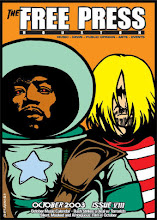Youth w/o youth
Strange how the movies, just like politics, eat their own. Case in point Youth Without Youth has been regulated to the corner, the last stop on the train tracks to dvd oblivion, a brief release in a limited venue. But it's a strong film from a major director.
Youth Without Youth heralds the return of sorts of Francis Coppola behind the camera. While many of his 60s and 70s era colleagues are more prolific Coppola's varied interest have limited his filmography; the last film he actually helmed was 1997's The Rainmaker. As a film YWY will find its greatest fans among those that feel an affinity for movies like Inland Empire or dreamy European cinema in general. The narrative weaves a story in a kind of elliptical pattern. A young man, Dominic (an agreeable Tim Roth), who's been struck by lightning lies wrapped in bandages in an atmospheric hospital. His story unfolds like a trance (thus the Lynch refernce) that recounts his life, his split personality and his eventual attempt, as a master linguist (he's able to understand blabbering in Sancrit), to help a woman reunite with her reincarnated self - in a cave in Nepal. There's a sense of unworldliness to some of the drama, like the merging of multiple dimensions.
Coppola doesn't let his audience down, YWY's visually stunning whether in close-up or wide tableaux, yet the intricate structure of the story demands more attention than any average programmer. Scenes that are bathed in golden hues blend with important shots of the actors frozen in blue. The action occurs over several years but the timeline seems to allow for back and forth scenes. The camera moves with a confident hand. While it's not an action film there are a couple of grand vistas and some Nazis.
Dominic runs afoul of a doctor who wants to experiment with a million volts on humans, the end effect to lengthen life. But Dominic's own encounter with lightning has him convinced he's a young man in an octogenarian body.
There are rewards in the film's payoff, perhaps thoughts on a film littered with archetypal images. The source material is a story by Mercea Eliade and indeed Coppola finds a visual equivalent to the merger of ancient faiths and modern myths.









